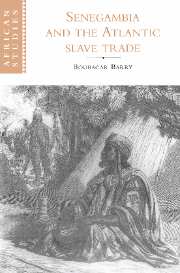Book contents
- Frontmatter
- Contents
- Preface
- Map
- I Senegambia from the fifteenth to the seventeenth century: a haven for incoming populations, a station for migrants on the move
- II Senegambia in the eighteenth century: the slave trade, ceddo regimes and Muslim revolutions
- III Senegambia in the first half of the nineteenth century: legitimate trade and sovereignty disputes
- IV Senegambia in the second half of the nineteenth century: colonial conquest and resistance movements
- 14 Colonial imperialism and European rivalries in Senegambia
- 15 Last-ditch resistance movements of legitimist rulers in northern Senegambia
- 16 The conquest of the Southern Rivers region
- 17 The balancing act of the Almamis of Timbo in their attempts to cope with centrifugal forces
- 18 Bokar Biro and the conquest of Futa Jallon
- 19 Mass resistance movements among the Joola and the Konyagi
- Conclusion
- Notes
- Bibliography
- Index
- Other books in the series
18 - Bokar Biro and the conquest of Futa Jallon
Published online by Cambridge University Press: 31 October 2009
- Frontmatter
- Contents
- Preface
- Map
- I Senegambia from the fifteenth to the seventeenth century: a haven for incoming populations, a station for migrants on the move
- II Senegambia in the eighteenth century: the slave trade, ceddo regimes and Muslim revolutions
- III Senegambia in the first half of the nineteenth century: legitimate trade and sovereignty disputes
- IV Senegambia in the second half of the nineteenth century: colonial conquest and resistance movements
- 14 Colonial imperialism and European rivalries in Senegambia
- 15 Last-ditch resistance movements of legitimist rulers in northern Senegambia
- 16 The conquest of the Southern Rivers region
- 17 The balancing act of the Almamis of Timbo in their attempts to cope with centrifugal forces
- 18 Bokar Biro and the conquest of Futa Jallon
- 19 Mass resistance movements among the Joola and the Konyagi
- Conclusion
- Notes
- Bibliography
- Index
- Other books in the series
Summary
In August 1889 France, having shaken off the diplomatic challenge from its rival the British, set out resolutely to implement a policy of peaceful expansion in Futa Jallon. It pursued this policy into the early months of 1896. At the same time, however, France worked to take control of all territories bordering on the kingdom, encircling it and applying constant pressure designed to bring the Almamis, by gradual stages, to submit to French authority.
This policy meant a relaxation of military pressure. The two Almamis, Amadu of the Alfaya faction and Bokar Biro of the Soriya, took advantage of the lull to resist French demands. They were thus able, through a vigorous diplomatic counter-offensive, to maintain their independence as long as was feasible. As from 1896, however, France decided to use armed force to push through its program. This decision coincided with a serious political and social crisis in Futa Jallon. This crisis prevented the kingdom from mounting a durable resistance to colonial conquest.
Bokar Biro, strongman of the Soriya faction, came to power in 1890. From the moment of his accession, he set about establishing a centralized, unified, and authoritarian regime. His efforts aroused opposition from Alfaya and Soriya candidates for the office of Almami, as well as the hostility of the principal provincial chiefs, namely those of Labé, Timbi, and Fugumba, keen to safeguard their autonomy.
- Type
- Chapter
- Information
- Senegambia and the Atlantic Slave Trade , pp. 284 - 293Publisher: Cambridge University PressPrint publication year: 1997



